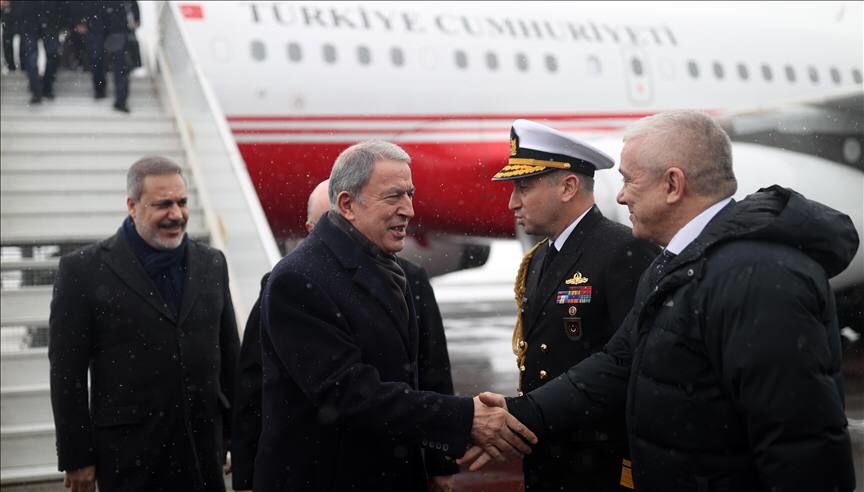Speaking to the website of the Strategic Council on Foreign Relations, Siamak Kakaei continued: These issues proceeded with all seriousness, especially in the last weeks of the last year, and led to the first meeting of Turkish and Syrian security officials at the level of defense ministers in Moscow.
Referring to the remarks of Erdogan, who had said that there was no permanent enemy in politics, he explained: The president of Turkey used this sentence with an aim of justifying the closeness or holding negotiations with Syria.
According to Kakaei, the President of Turkey announced that such negotiations will probably be held at three levels: first at the level of security, second at the level of foreign ministers and third probably at the level of presidents.
The expert, analyzing the reasons for Turkey’s turn towards Syria after more than a decade of tension and breaking of relations, as well as the series of strict measures that Ankara took against Syria, ranging from supporting and arming opposition and terrorist groups in Syria to occupying some areas of the northeast and northwest regions and Idlib, which is a clear expression of Turkey’s hostile policy against Syria, stated two factors:
Regarding the first factor in the turn of Turkey’s policy towards Syria, Kakaei referred to the important presidential and parliamentary elections in June 2023 and said: Erdogan, or the same Justice and Development Party, in the context of changing the direction of foreign policy and trying to attract funds from Arab countries and also the reduction of regional tensions tends to move towards normalization of regional relations the reduction of tensions with Syria can also be analyzed in the form of this project so that Ankara can show that the foreign policy of justice and development has flexibility at different times and advances it within the framework of interests and national security of Turkey.
The expert on Turkey affairs explained about the negotiations between the security officials of Turkey and Syria and said: In those negotiations, the Syrian officials emphasized that it is necessary for Turkey to withdraw from the territory of Syria; that is to say, they put this issue as a precondition. On the other hand, Turkey and Ankara officials such as Erdogan declared somehow that Turkey’s presence in areas of Syrian territory is in line with the protection of the country’s territorial interests and justified their presence.
He added: Turkey has declared that it respects the territorial integrity of Syria, and its objective has been to confront terrorist and separatist groups in Syria, which have also endangered Turkey’s national security. But Syria does not accept this intension of Turkey and has declared the presence of Turkey in the northern regions of Syria as a violation of its national sovereignty.
Kakaei emphasized that if this issue is looked at in the context of the election issue, it can be said that Turkey’s goal is to be capable of convincing the country’s authorities to support Ankara’s plans through a kind of normalization of relations with Syria. This means that either Turkey conducts military operations several kilometers from Syrian territory within the framework of the Adana Agreement or convinces Syria to conduct joint operations against Syrian Kurdish groups.
He continued: The fulfillment of this demand seems far from expected, and some believe that the opposition of the United States and Russia to Turkey’s military operations in northern Syria can be the basis for Turkey’s moves to negotiate with the Syrian government.
According to the expert, the second factor that is related to the contradictions of Turkey’s foreign policy in relation to Syria is that Ankara will not confine itself with negotiating or not negotiating with Syria, and some observers believe that it is possible that with Turkey’s elections approaching and in a situation where the internal environment of that country does not go in line with the electoral policies of the Justice and Development Party, there exists the possibility of Turkish military operations in northern Iraq and even in northern Syria against the Kurdish groups that Turkey considers as terrorist and affiliated with PKK.
Kakaei explained that Erdoğan and the ruling party in this way want the security conditions to dominate the election atmosphere.
The expert also believes that such measures and options will be a card for Erdoğan in order to put his rivals in a tight spot and in a way attract a part of the votes to the Justice and Development Party.
Kakaei finally explained: In general, the issue of negotiations between Turkey and Syria will not be an easy process that will come to a conclusion soon; especially since, on the one hand, Damascus insists on an end to Turkish occupation and, on the other hand, Ankara does not want a military withdrawal from Syria so easily. Such issues will be the main challenge in the negotiations between Damascus and Ankara.










0 Comments